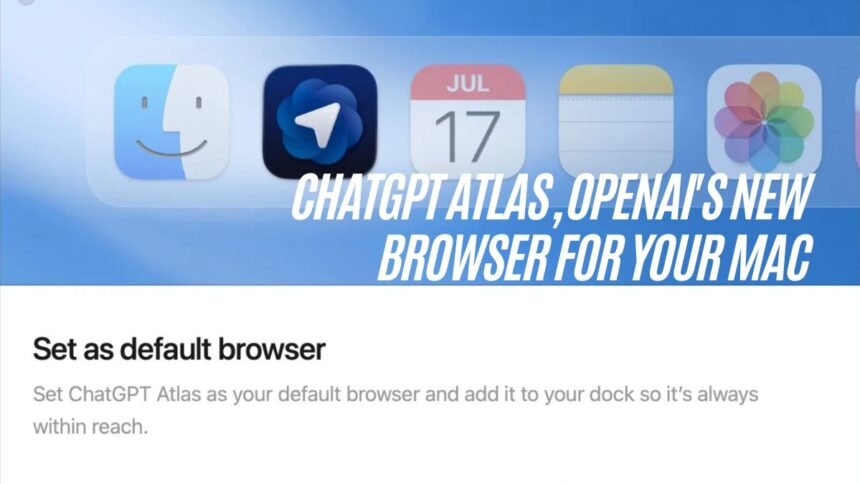OpenAI has officially entered the browser market with the launch of ChatGPT Atlas, a new macOS application built around its flagship AI model. Available immediately to Free, Plus, Pro, and Go users, Atlas integrates search, an AI assistant, and a novel “agent mode” that can perform tasks on the web. The news was announced today in a blog post and live-streamed conversation with OpenAI CEO Sam Altman and the team, which is led by Ben Goodger, former lead of Google Chrome and Mozilla Firefox.
The idea with Atlas is to integrate regular web browsing with the capabilities of ChatGPT. “We think of Atlas as the browser with ChatGPT natively inside, not just tacked onto,” Altman said during the livestream. “It’s about making information access more intuitive and efficient.”
One of the most notable features is the new tab experience, which unifies entering URL and asking a question. Results are displayed in tabs, making it simple to jump between links, images, videos and news sources for your query. OpenAI says it results in faster and more relevant search results within a single view, while maintaining the context between ChatGPT responses and standard search results.
Beyond the unified search, Atlas features a ChatGPT sidebar that provides context-aware assistance on any webpage. “You can also use the side bar to summarise content and compare the products you are viewing as well as even analysing data direct from a page,” Goodger said. The objective is to assist the user using AI without interrupting their browsing. Another neat feature is “Cursor” which allows users to highlight text within emails, documents or calendar invites and then receive help from ChatGPT with one click of a button. This feature could rewrite highlighted text on the fly, without having to open up a new chat window.
Perhaps the most ambitious feature of Atlas is its “Agent Mode,” currently available in preview. This mode allows ChatGPT to open tabs and navigate websites to complete tasks with user approval. Agent mode is for “allowing you do things like research products, book appointments or manage tasks all within the context of your browser,” a product manager said during today’s livestream. He warned that the feature is currently in its early stages and may get things wrong on more complex workflows, but insisted OpenAI is “quickly increasing reliability and task success rates.”
To further enhance the browsing experience, Atlas incorporates optional “browser memories.” This feature allows ChatGPT to remember context from previously visited sites and recall relevant details when needed. Picture picking up your product research right where you stopped, or having to-do lists pop up based on what you’ve just done. That’s what OpenAI is promising. You get full control over these memories you can look through them, archive what you want, or just delete them in your settings. There’s also a handy toggle in the address bar, so you decide which pages ChatGPT can access. Privacy is a core issue and OpenAI has taken measures to prevent abuse. AI models are not trained on browsing content by default, users have a choice to opt in through data control settings. Agent mode is also subject to restrictions, preventing it from running code, downloading files, or accessing other apps. “We’ve added pauses to ensure you’re watching when Agent Mode is taking actions on sensitive sites, like financial institutions,” Altman emphasized.
While OpenAI admits that agents are still vulnerable to concealed bad instructions in webpages or emails, the company says it has undertaken many red-team exercises and designed protections to adapt to new attacks. But they warned that “the safeguards won’t prevent every attack.” Not just brinyTube, the unveiling of Atlas has the potential to revolutionize browsing. OpenAI is blurring the boundary between browser and search engine by putting AI-generated answers side-by-side with old-school search results. It could be part of a change to the browsing model, where users query and browse at once rather than visiting sites from a search engine. Moreover, Agent Mode creates the opportunity for AI which could independently move through websites and perform tasks in the user’s name. Atlas is currently available on macOS, and users can import bookmarks, passwords and browsing history from their current browser when first launching Atlas. Windows, iOS and Android editions are expected in the next few months. The roadmap will also features multi-profile support, enhanced developer tools and advising websites to use ARIA tags for better agent compatibility.












